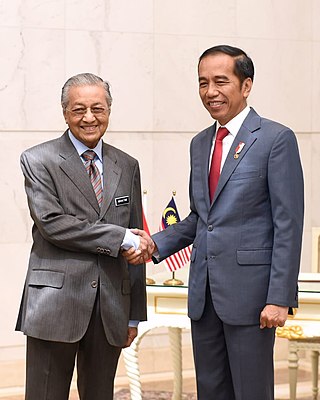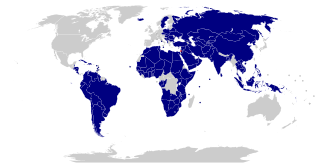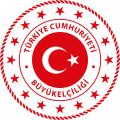
Cyprus is a member of the United Nations along with most of its agencies as well as the Commonwealth of Nations, World Bank, International Monetary Fund and Council of Europe. In addition, the country has signed the General Agreement on Tariffs and Trade (GATT) and the Multilateral Investment Guarantee Agency Agreement (MIGA). Cyprus has been a member of the European Union since 2004 and in the second half of the 2012 it held the Presidency of the Council of the European Union.

Like its Eastern Caribbean neighbours, the main priority of Dominica's foreign relations is economic development. The country maintains missions in Washington, New York, London, and Brussels and is represented jointly with other Organisation of Eastern Caribbean States (OECS) members in Canada. Dominica is also a member of the Caribbean Development Bank (CDB), Organisation internationale de la Francophonie, and the Commonwealth of Nations. It became a member of the United Nations and the International Monetary Fund (IMF) in 1978 and of the World Bank and Organization of American States (OAS) in 1979.
The foreign relations of Afghanistan are in a transitional phase since the 2021 fall of Kabul to the Taliban and the collapse of the internationally-recognized Islamic Republic of Afghanistan. No country has recognised the new regime, the Islamic Emirate of Afghanistan. Although some countries have engaged in informal diplomatic contact with the Islamic Emirate, formal relations remain limited to representatives of the Islamic Republic.

Since independence, Indonesian foreign relations have adhered to a "free and active" foreign policy, seeking to play a role in regional affairs commensurate with its size and location but avoiding involvement in conflicts among major powers. During the presidency of Sukarno, Indonesia's foreign relations were marked by engagement with other newly independent nations in Asia and Africa, as exemplified by the Bandung Conference, the subsequent foundation of the Non-Aligned Movement and a confrontational attitude towards Western powers, justified by a belief in the CONEFO and opposition to what Sukarno termed as NEKOLIM.

The Islamic Republic of Pakistan emerged as an independent country through the partition of India in August 1947 and was admitted as a United Nations member state in September 1947. It is currently the second-largest country within the Muslim world in terms of population, and is also the only Muslim-majority country in possession of nuclear weapons. De facto, the country shares direct land borders with India, Iran, Afghanistan, and China.
Foreign relations of Qatar is conducted through its Ministry of Foreign Affairs. Arab states were among the first to recognize Qatar, and the country gained admittance to the United Nations and the Arab League after achieving independence in 1971. The country was an early member of OPEC and a founding member of the Gulf Cooperation Council (GCC). Diplomatic missions to Qatar are based in its capital, Doha.
Foreign relations of Somalia are handled primarily by the President as the head of state, the Prime Minister as the head of government, and the Minister of Foreign Affairs of the Federal Government.

The foreign policy of Solomon Islands as of 2008 was described by the Solomon Islands government as a "look north" policy, aimed as strengthening diplomatic and economic relations with Asian countries for development purposes.

The China–New Zealand relations, sometimes known as Sino–New Zealand relations, are the relations between China and New Zealand. New Zealand recognised the Republic of China after it lost the Chinese Civil War and retreated to Taiwan in 1949, but switched recognition to the People's Republic of China on 22 December 1972. Since then, economic, cultural, and political relations between the two countries have grown over the past four decades. China is New Zealand's largest trading partner in goods and second largest trading partner in services. In 2008, New Zealand became the first developed country to enter into a free trade agreement with China. In recent years, New Zealand's extensive economic relations with China have been complicated by its security ties to the United States.

China–Turkey relations are the international relations between China and Turkey. Current official relations were established in 1934 and Turkey recognized the People's Republic of China (PRC) on 5 August 1971.

The Embassy of the United States in Beijing is the diplomatic mission of the United States in China. It serves as the administrative office of the United States Ambassador to China. The embassy complex is in Chaoyang District, Beijing.

The foreign relations of the State of Palestine have been conducted since the establishment of the Palestine Liberation Organization (PLO) in 1964. Since the Oslo Accords, it seeks to obtain universal recognition for the State of Palestine on the 1967 borders, with East Jerusalem as its capital. As of 2 June 2023, 139 of the 193 United Nations (UN) member states officially recognize the State of Palestine.

The Embassy of the Republic of Indonesia in Beijing is the diplomatic mission of the Republic of Indonesia to the People's Republic of China. The embassy is concurrently accredited to Mongolia. Indonesia also has three consulate generals in Guangzhou, Hong Kong, dan Shanghai. The first Indonesian ambassador to China was Arnold Mononutu (1953–1955). The current ambassador, Djauhari Oratmangun, was appointed by President Joko Widodo on 20 February 2018.










